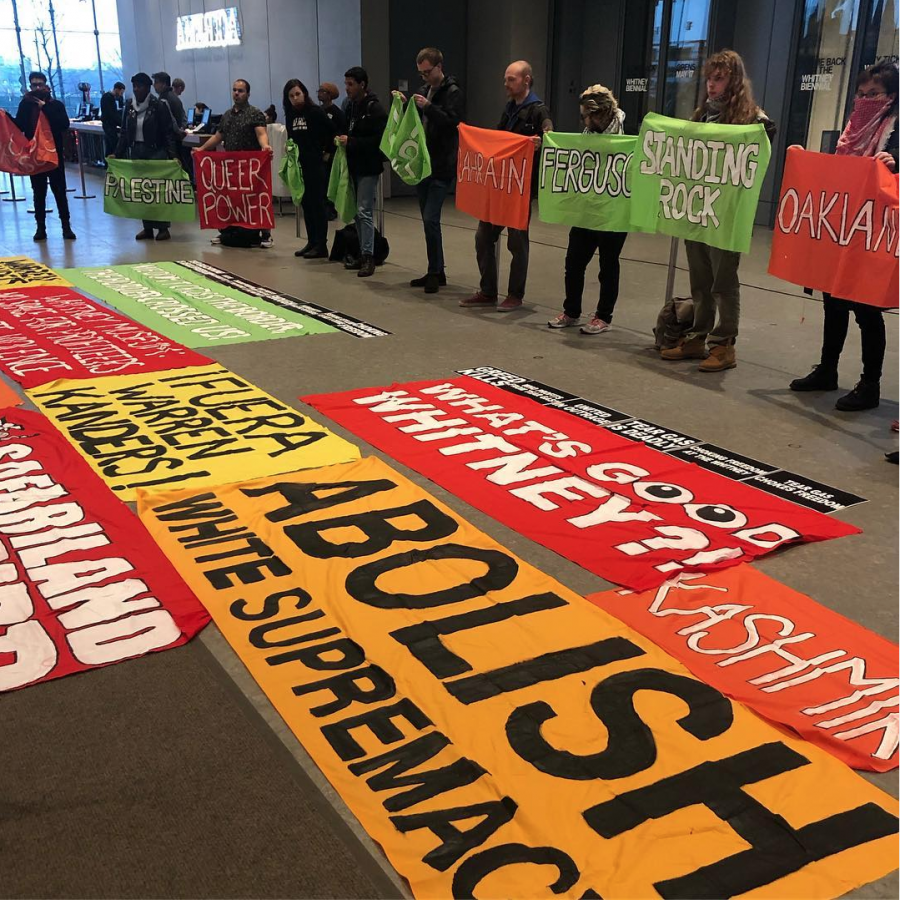An activist group co-founded by an NYU professor has continued a series of protests against the Whitney Museum of American Art due to its Vice Chairman’s connection to weapons used against migrants at the U.S.-Mexico border.
Vice Chairman Warren B. Kanders is the majority owner and CEO of Safariland, the corporation that produced the tear gas canisters used at the border. Three days after news of Kanders’ ties to the company broke, more than 100 of the museum’s staff members signed a joint letter in November demanding action.
Since March 22, Decolonize This Place — a movement co-founded by NYU adjunct instructor Amin Husain — has launched a series of weekly protests that have taken place every Friday at the Whitney called Nine Weeks of Art and Action. DTP advocates for workers, civil rights and Palestinian liberation, among other initiatives.
In a letter to the Whitney’s Board of Trustees, Kanders refuted that he was directly responsible in Safariland’s decision to manufacture military equipment and tear gas.
“The staff letter implies that I am responsible for the decision to use these products,” Kanders wrote. “I am not. That is not an abdication of responsibility, it is an acknowledgement of reality.”
Whitney Director Adam Weinberg responded to the staff’s letter in December, saying that the museum respects the right to dissent as long as it does not put anyone or any art in danger, but did not clarify if Kanders would keep his position.
Gallatin senior and NYU Asian American Political Activism Coalition President Aree Worawongwasu was introduced to DTP in October 2017, when she attended the second annual Anti-Columbus Day Tour at the American Museum of Natural History.
Worawongwasu became involved as a core organizer within the movement through Professor Husain’s “Arts, Activism, and Beyond” seminar, which she took with Gallatin sophomore and NYU APAC Vice President Madison Kelts in spring 2018. Together, with Professor Husain’s mentorship last winter, they formed Decolonial Time: Zone, a youth coalition building on the work of Decolonize This Place. The two students have been heavily involved with the campaign to protest Kanders’ ties to Sarafiland.
To Worawongwasu, who is pursuing a concentration in decolonization, the removal of Kanders from the museum board is only a starting point in the effort to decolonize arts institutions.
“We need the Whitney to not only hold Kanders accountable, but also all its board of trustee members, rooting out the culture of toxic philanthropy in cultural institutions and clarifying lines of acceptability in the Board of Trustees,” Worawongwasu said.
Kelts, who is also a student organizer with NYU Students for Justice in Palestine and NYU Divest for Climate Justice, said that museums need to begin the process of decolonization by knowing whose land they are on and giving it back.
“NYU and the Whitney are on the land of the Lenape people and have accelerated gentrification of Chinatown and the meatpacking district,” Kelts said. “They’ve displaced working-class communities of color and LGBTQ communities.”
DTP, along with more than 30 collaborating collectives, will be hosting its fourth protest this Friday evening in the Whitney Museum lobby.
GLS first-year Sierra Lewter and Gallatin sophomore Christina Schuler da Costa Ferro, who are artists and organizing interns at DTP, said they are expecting a large crowd at the event.
“There were about 30 to 40 people at the first protest back in March,” Schuler da Costa Ferro, who is studying art as an alternative history, said. “With each passing week, the number keeps growing. You really see the power of shared spaces that practice solidarity.”
Lewter said that her internship with DTP has helped her learn more about intersectional organizing, something she had struggled with before.
“When I went to high school in Washington, D.C., I tried putting together walkouts and gun protests,” Lewter said. “But there was a lot of pushback from [administrators], and they tried to scare people out of it. Helping to organize the nine weeks of art and action has helped me not only stand firmer in my personal beliefs, but has also opened my eyes to how our oppression and liberation is tied to each other.”
Email Grace Moon at [email protected].
























































































































































